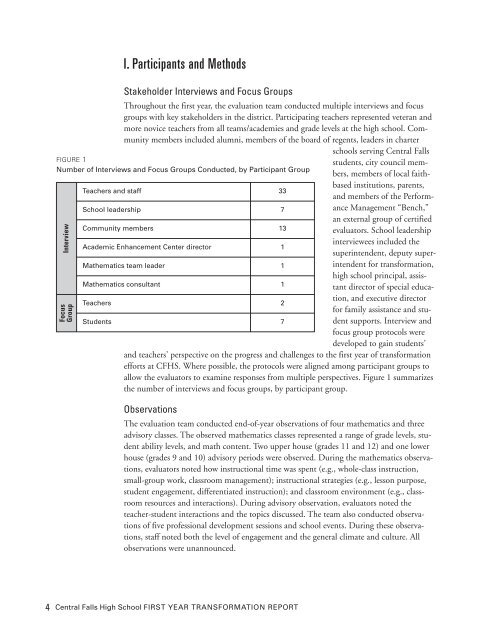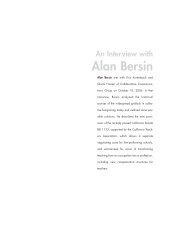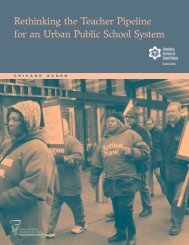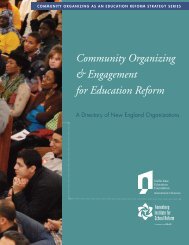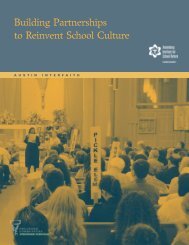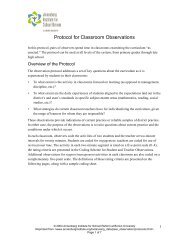Central Falls Transformation Report - Annenberg Institute for School ...
Central Falls Transformation Report - Annenberg Institute for School ...
Central Falls Transformation Report - Annenberg Institute for School ...
Create successful ePaper yourself
Turn your PDF publications into a flip-book with our unique Google optimized e-Paper software.
I. Participants and Methods<br />
Stakeholder Interviews and Focus Groups<br />
Throughout the first year, the evaluation team conducted multiple interviews and focus<br />
groups with key stakeholders in the district. Participating teachers represented veteran and<br />
more novice teachers from all teams/academies and grade levels at the high school. Community<br />
members included alumni, members of the board of regents, leaders in charter<br />
schools serving <strong>Central</strong> <strong>Falls</strong><br />
FIGURE 1<br />
Number of Interviews and Focus Groups Conducted, by Participant Group<br />
Interview<br />
Focus<br />
Group<br />
students, city council members,<br />
members of local faithbased<br />
institutions, parents,<br />
and members of the Per<strong>for</strong>mance<br />
Management “Bench,”<br />
an external group of certified<br />
evaluators. <strong>School</strong> leadership<br />
interviewees included the<br />
superintendent, deputy superintendent<br />
<strong>for</strong> trans<strong>for</strong>mation,<br />
high school principal, assistant<br />
director of special education,<br />
and executive director<br />
<strong>for</strong> family assistance and student<br />
supports. Interview and<br />
focus group protocols were<br />
developed to gain students’<br />
and teachers’ perspective on the progress and challenges to the first year of trans<strong>for</strong>mation<br />
ef<strong>for</strong>ts at CFHS. Where possible, the protocols were aligned among participant groups to<br />
allow the evaluators to examine responses from multiple perspectives. Figure 1 summarizes<br />
the number of interviews and focus groups, by participant group.<br />
Teachers and staff 33<br />
<strong>School</strong> leadership 7<br />
Community members 13<br />
Academic Enhancement Center director 1<br />
Mathematics team leader 1<br />
Mathematics consultant 1<br />
Teachers 2<br />
Students 7<br />
Observations<br />
The evaluation team conducted end-of-year observations of four mathematics and three<br />
advisory classes. The observed mathematics classes represented a range of grade levels, student<br />
ability levels, and math content. Two upper house (grades 11 and 12) and one lower<br />
house (grades 9 and 10) advisory periods were observed. During the mathematics observations,<br />
evaluators noted how instructional time was spent (e.g., whole-class instruction,<br />
small-group work, classroom management); instructional strategies (e.g., lesson purpose,<br />
student engagement, differentiated instruction); and classroom environment (e.g., classroom<br />
resources and interactions). During advisory observation, evaluators noted the<br />
teacher-student interactions and the topics discussed. The team also conducted observations<br />
of five professional development sessions and school events. During these observations,<br />
staff noted both the level of engagement and the general climate and culture. All<br />
observations were unannounced.<br />
4 <strong>Central</strong> <strong>Falls</strong> High <strong>School</strong> FIRST YEAR TRANSFORMATION REPORT


